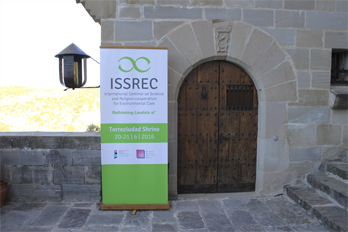
Scientists and religious leaders from 15 countries and 8 religious denominations signed a “Declaration of Torreciudad” to promote collaboration of Science and major religions in the conservation of the environment, as the culmination of the International Seminar on Science and Religion Cooperation for Environmental Care (ISSREC) held at the Shrine of Torreciudad (Huesca), past 20 and 21.
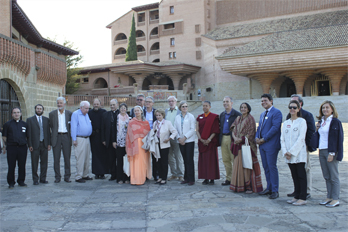 The Declaration emphasizes the importance of dialogue between science and religion to achieve effective decisions in solving environmental problems. On the one hand, “Science plays a decisive role in the understanding of environmental issues, monitoring trends and projecting future results”, but on the other, “science alone can not solve the current ecological crisis since cooperation is needed closer with actors that affect social attitudes and environmental decisions.” In this sense, it
The Declaration emphasizes the importance of dialogue between science and religion to achieve effective decisions in solving environmental problems. On the one hand, “Science plays a decisive role in the understanding of environmental issues, monitoring trends and projecting future results”, but on the other, “science alone can not solve the current ecological crisis since cooperation is needed closer with actors that affect social attitudes and environmental decisions.” In this sense, it 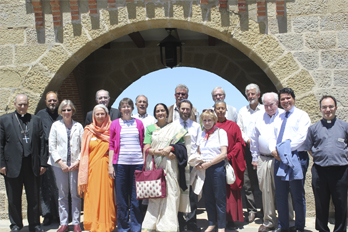 becomes clear that “religions and spiritual traditions are the oldest source of moral values and inspiration for behaviour” and that “religious and spiritual communities have an important role in the education of young throughout the world”. Therefore, “closer cooperation between scientists and religious leaders in promoting environmental awareness and concrete action is needed”.
becomes clear that “religions and spiritual traditions are the oldest source of moral values and inspiration for behaviour” and that “religious and spiritual communities have an important role in the education of young throughout the world”. Therefore, “closer cooperation between scientists and religious leaders in promoting environmental awareness and concrete action is needed”.
The seminar, led by Emilio Chuvieco and organized by the Department of Environmental Ethic Foundation Tatiana Perez de Guzmán el Bueno-Universidad de Alcalá and the Foundation for the Social Promotion of Culture, focused on the teachings of the encyclical “Laudato Si” of Pope Francisco, a year after its publication.
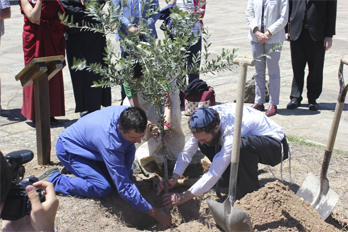 Pope Francis sent a message to participants wishing the Seminar “serve to promote scientific and inter religious dialogue on the care of the Common House, and encourage joint efforts to promote a more supportive awareness for the good of each and every one of the men”.
Pope Francis sent a message to participants wishing the Seminar “serve to promote scientific and inter religious dialogue on the care of the Common House, and encourage joint efforts to promote a more supportive awareness for the good of each and every one of the men”.
In the close of the seminar, all participants planted an olive tree at the Shrine of Torreciudad, as a natural symbol of the commitment of the various religious traditions and the scientific community in environmental conservation.
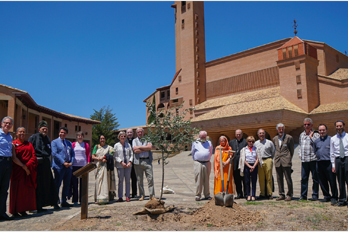 The seminar began with a scientific analysis of the environmental situation. Thomas Stocker, coordinator of the group on Physical Basis of Climate Change’s latest report of the Intergovernmental Panel on Climate Change (IPCC) of the UN, explained the scientific basis of climate change. Anny Cazenave, Director of Earth Sciences at the International Institute of Space Science (Bern, Switzerland), described the
The seminar began with a scientific analysis of the environmental situation. Thomas Stocker, coordinator of the group on Physical Basis of Climate Change’s latest report of the Intergovernmental Panel on Climate Change (IPCC) of the UN, explained the scientific basis of climate change. Anny Cazenave, Director of Earth Sciences at the International Institute of Space Science (Bern, Switzerland), described the 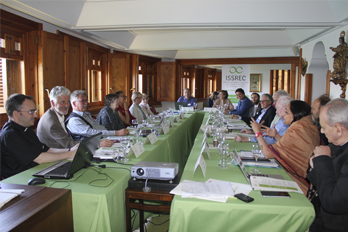 environmental problems of inland waters and oceans. Peter H. Raven, an expert scientist in botany from the University of Washington in St. Louis, warned with figures on biodiversity loss and Josef Settele, professor of ecology at the Martin Luther University of Halle-Wittenberg, explained the problems of agriculture and ecosystems interrelation.
environmental problems of inland waters and oceans. Peter H. Raven, an expert scientist in botany from the University of Washington in St. Louis, warned with figures on biodiversity loss and Josef Settele, professor of ecology at the Martin Luther University of Halle-Wittenberg, explained the problems of agriculture and ecosystems interrelation.
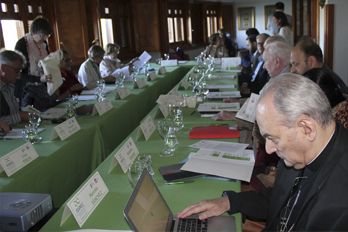 Experts in environmental ethics staged the presentations of the table “Creating crisis: dimensions of the ecological crisis”. Celia Deane-Drummond, from the University of Notre Dame, spoke of the close relationship between ecological justice and environmental justice. Sigurd Bergman, professor, in the Department of Philosophy and Religious Studies at the Norwegian University of Science and Technology in Trondheim, spoke about poverty and society after growth. Josep Mallarach, of the World Commission on Protected Areas of the International Union for Conservation of Nature, addressed the issue of the preservation of sacred spaces. Hilary Marlow, director of the Faraday Institute for Science and
Experts in environmental ethics staged the presentations of the table “Creating crisis: dimensions of the ecological crisis”. Celia Deane-Drummond, from the University of Notre Dame, spoke of the close relationship between ecological justice and environmental justice. Sigurd Bergman, professor, in the Department of Philosophy and Religious Studies at the Norwegian University of Science and Technology in Trondheim, spoke about poverty and society after growth. Josep Mallarach, of the World Commission on Protected Areas of the International Union for Conservation of Nature, addressed the issue of the preservation of sacred spaces. Hilary Marlow, director of the Faraday Institute for Science and 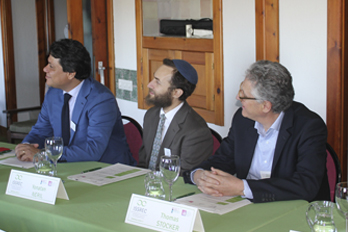 Religion, and Associate Professor of the Faculty of Theology at the University of Cambridge, highlighted the ethical and biblical values for nature conservation in the Christian tradition. Professor Wal Farouk, Egyptian President of the Cultural Center Tawasul for Inter-civilizations Dialogue spoke about the environmental values in Islamic societies. Naditha Krishna, professor at the University of Madras (India) on her part, explained the ethical and cultural values of the Hindu tradition, for the care of nature.
Religion, and Associate Professor of the Faculty of Theology at the University of Cambridge, highlighted the ethical and biblical values for nature conservation in the Christian tradition. Professor Wal Farouk, Egyptian President of the Cultural Center Tawasul for Inter-civilizations Dialogue spoke about the environmental values in Islamic societies. Naditha Krishna, professor at the University of Madras (India) on her part, explained the ethical and cultural values of the Hindu tradition, for the care of nature.
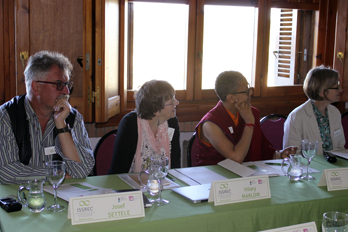 Religious leaders contributed their specific visions in the table moderated by Archbishop President of the Pontifical Academy of Sciences Mons. Marcelo Sánchez Sorondo, and dedicated to “ecological spirituality, approach and action lines for integral ecology”. Jerusalem Rabbi Yonatan Neril, founder of the Interfaith Centre for Development; Buddhist nun Tsunma Karma Chimey Lhatso; Attorney General of the Cistercians, P. Lluc Torcal; Bulgarian Orthodox archdeacon, Petar Gramatikov Plovdiv and Swamini Umananda Hindu nun, were able to highlight the contributions of each of their religious traditions to nature conservation.
Religious leaders contributed their specific visions in the table moderated by Archbishop President of the Pontifical Academy of Sciences Mons. Marcelo Sánchez Sorondo, and dedicated to “ecological spirituality, approach and action lines for integral ecology”. Jerusalem Rabbi Yonatan Neril, founder of the Interfaith Centre for Development; Buddhist nun Tsunma Karma Chimey Lhatso; Attorney General of the Cistercians, P. Lluc Torcal; Bulgarian Orthodox archdeacon, Petar Gramatikov Plovdiv and Swamini Umananda Hindu nun, were able to highlight the contributions of each of their religious traditions to nature conservation.
More information:
http://www.issrec.org

